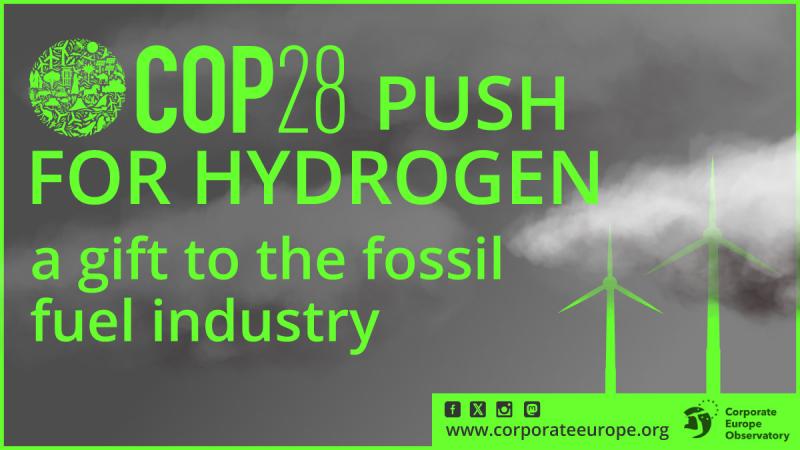Stay always informed
Interested in our articles? Get the latest information and analysis straight to your email. Sign up for our newsletter.

[Brussels, 30 Nov] – As international climate talks kick off, new research exposes the alliance between the European Union, the European hydrogen lobby, and COP28’s host country, the United Arab Emirates to fuel a lucrative hydrogen market.
Corporate Europe Observatory's paper, "COP28 Push for Hydrogen: a Gift to the Fossil Fuel Industry," exposes the prominent role of hydrogen in Big Oil and Gas’ strategy to capitalise on alleged low carbon technologies to pump out even more fossil fuels. Devised in collaboration with global consultancies such as McKinsey on behalf of their fossil fuel clients, the COP28 stage is set to peddle hydrogen as a silver bullet to counter climate destruction.
Documents obtained by Corporate Europe Observatory reveal how Hydrogen Europe (HE), the most influential European hydrogen lobby group, has been at the forefront of the European Commission’s crusade to establish deals enabling access to hydrogen imports while simultaneously securing raw materials for European industry.
Hydrogen Europe facilitated a key EU-Egypt hydrogen deal at COP27. Now in the run-up to COP28, the lobby has used its privileged access to the European Commission and the Egyptian government to demand public funds to benefit companies like the Suez Canal and the Port of Rotterdam.
Documents also show the shocking extent to which the European Commission actively seeks Hydrogen Europe’s involvement. In June, the European Commission's DG INTPA warned Hydrogen Europe of a visit by the Mauritanian energy minister and facilitated a meeting with Hydrogen Europe’s CEO Jorgo Chatzimarkakis. In October a deal for the development of a green hydrogen programme in Mauritania under the EU's Global Gateway program was put in place.
COP28's agenda reveals ambitions to double annual global hydrogen production - from 95 to 180 million tonnes - by 2030. Data from the International Energy Agency shows that 99% of the hydrogen produced in 2022 was derived from fossil fuels, with a carbon footprint of over 900 million tonnes (Mt). An increased target will go hand-in-hand with a massive boom in the production of fossil based hydrogen and climate destruction.
Despite the unrealistic and environmentally lethal nature of hydrogen targets, they are being used to justify the locking in of the fossil-based economy for the next decades. At COP28, the International Hydrogen Trade Forum (ITHF) will convene for the first time and is led by the UAE and the Netherlands. The world's most important hydrogen lobby, the Hydrogen Council, is a key player in the ITHF and advocates for exaggerated hydrogen targets, which has led to the promotion of new pipelines for transporting non-existent 'clean' hydrogen over long distances.
The COP28 summit, with chief lobbyist of the Hydrogen Council, Daria Nochevnik, acting as special advisor on hydrogen to the COP28 Presidency, is shaping up to become yet another platform for big polluters and governments to rack up hydrogen deals, divesting attention, efforts and funds away from genuine climate crisis solutions.
Belén Balanyá, campaigner and researcher at Corporate Europe Observatory said: "Far from the climate leader it poses as, the EU is a big driver of the global hydrogen craze, and it does so in close partnership with the hydrogen lobby. An immediate halt to new coal, oil, and gas projects and a rapid phase-out of production is what the COP28 climate summit should deliver. But Big Oil and Gas are eager to keep drilling and have found in hydrogen the ideal escape hatch to do so."
For more information, please contact:
Belén Balanyá, Corporate Europe Observatory researcher and campaigner
+31633090386, belen@corporateeurope.org
Gail Rego, Media Relations,
+32487202211, gail@corporateeurope.org
Additional Information:
EU’s and hydrogen industry interests on UAE’s hydrogen push
More information on the corporate capture of climate negotiations
For more information on the impacts and risks of hydrogen, and the corporate lobby behind it see: